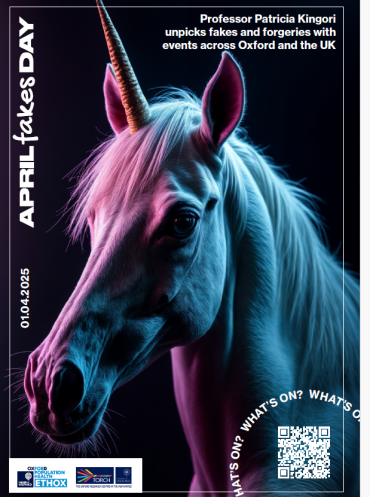Patricia Kingori , Professor of Global Health Ethics at Oxford Population Health's Ethox Centre, and The Oxford Research Centre in the Humanities (TORCH) , kick off April Fakes Day 2025 with a week-long cultural programme of exhibits and events that expose history's fakers, fraudsters and those who fool.
Throughout history, masterful fakers have exploited the trust of the innocent with convincing forgeries and falsehoods that shape our concept of reality.
In today's world, discerning real from fake requires more and more of our energy and attention ─ from fake versions of authentic products to false statements from those in positions of power. Examining who the fakers are and the tactics they use can help us understand more about the complexities of fakery and how it shapes our understanding of reality.
Professor Patricia Kingori, Professor of Global Health Ethics at Oxford Population Health's Ethox Centre
For this April Fools' Day, the fakers take centre stage through exhibitions, interactive events and discussions hosted by the University of Oxford alongside museums and art organisations across the UK.
The April Fakes Day programme will uncover the individuals behind famous art forgeries, medical quackery and Victorian 'antiquities' and explore their impact on society.
The initiative is led by Professor Patricia Kingori , Professor of Global Health Ethics at Oxford Population Health's Ethox Centre, with The Oxford Research Centre in the Humanities (TORCH).
Professor Kingori explains: 'In today's world, discerning real from fake requires more and more of our energy and attention ─ from fake versions of authentic products to false statements from those in positions of power. Examining who the fakers are and the tactics they use can help us understand more about the complexities of fakery and how it shapes our understanding of reality.
'April Fakes Day puts fakes and fraudsters throughout history under the spotlight. It explores the ethics of fakery and when it might be justified, and looks at whether fakes, like art forgeries, can ever be valuable in their own right.'
 April Fakes Day, University of Oxford
April Fakes Day, University of Oxford The programme includes an exclusive conversation with Britain's most prolific art forger John Myatt at Oxford's Ashmolean Museum. He will discuss why he forged, his views on art experts, and whether a 'genuine fake' can ever be valuable.
In Leeds, the Thackray Museum of Medicine will expose the quacks who shaped medicine, while London's Society of Antiquaries will uncover the most infamous forgers of the Victorian era.
April Fakes Day is part of the Wellcome-funded project, Fakes, Fabrications and Falsehoods in Global Health . Led by Professor Kingori, the research explores a blurring between the real and fake in global health and looks at how the same object can be simultaneously regarded as authentic and inauthentic, depending on the geographical location.
Professor Kingori's research focuses on different kinds of fakes, from seemingly harmless animals, relics, and paintings in museums, to more damaging deepfake videos, fake medicines, and misinformation that have harmful consequences in the modern world.
In her recent film, The Shadow Scholars, Professor Kingori explores Kenya's essay mills, where thousands of educated but underemployed Kenyans earn a living by supplying work for students globally.
'When it comes to fakes, we feel differently about different things,' says Professor Kingori. 'Most people don't really care if a painting is real or fake, but with education or medicine, people tend to be more concerned about authenticity. When we put fakes and fraudsters on this spectrum, it forces us to articulate what we think is real and, in doing so, what is really meant by the concept of truth.'
Highlights of the April Fakes Day programme include:
- Ashmolean Museum, Oxford : Art forger John Myatt and Professor Patricia Kingori will discuss the concept of a genuine fake and whether an art forgery can ever be valuable.
- Ultimate Picture Palace, Oxford : Explore the charisma and appeal of fraudsters with screenings of classic films Parasite (2019) and The Third Man (1949), with introductions from Professor Patricia Kingori and Angela Allen, an original member of The Third Man film crew.
- Pitt Rivers Museum, Oxford - Makers and Fakers : Learn about the lives of the Pitt Rivers Museum's makers and fakers and explore the stories behind the hundreds of copies, casts, replicas and fakes in collection. How do these often-neglected objects help us think differently about the relationship between making and museums? And how can making Zines (self-published magazines) challenge us to reconsider ideas of 'authenticity', 'originality' and creativity?
- Thackray Museum of Medicine, Leeds - Questionable Quackery: Travel back to the origins of the quack doctor and explore the most dangerous and daft cures of the 18th and 19th centuries.
- Society of Antiquaries, London - Spot the Fake! Explore the Victorian era's most infamous forgers at one of the world's oldest learned societies.This includes the Shadwell forgeries - 'medieval' lead objects forged by two illiterate mudlarkers, William Smith (Billy) and Charles Eaton in the mid-19th century. They are estimated to have produced thousands of items, including pilgrim badges, medallions, coins, statuettes, and spearheads - that they claimed to have found during the building of a new dock at Shadwell. Today, these objects are valuable in their own right.






